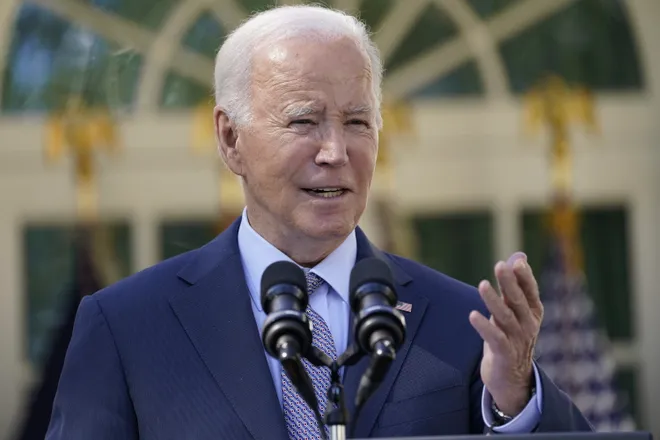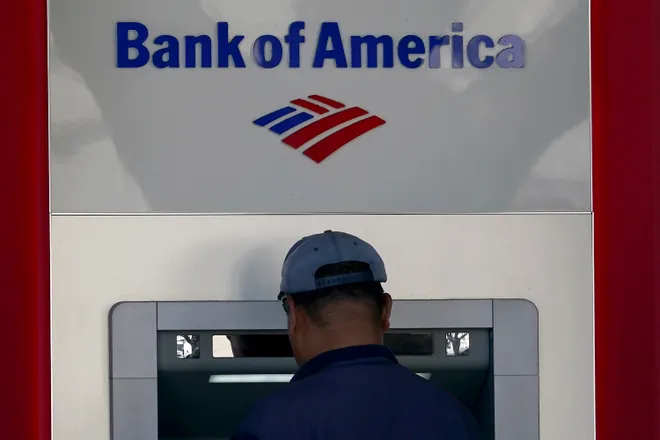Despite Biden administration 'junk' fee crackdown, ATM fees are higher than ever
At a moment when banks are slashing overdraft fees and President Biden is vowing a crackdown on hidden “junk” fees, the dreaded ATM surcharge has never been higher.
Americans who use an “out-of-network” ATM pay $4.73 in fees, on average, according to a study by the personal finance site Bankrate.
As other routine banking charges trend downward, ATM fees are creeping up. The average cash-machine customer paid $1.97 for the service in 1998, Bankrate reports. The average rose to $3.74 in 2010 and $4.52 in 2015.
Banks generally allow free use of their own ATMs. They may be leveraging out-of-network fees, banking experts say, to replace lost revenue from other sources.
“I think there’s a kind of Whac-A-Mole nature to bank fees,” said Ted Rossman, a senior industry analyst at Bankrate. “If one goes down, something else is going to go up. And ATM fees are a lever they are pulling.”
Learn more: Best current CD rates
The annual Bankrate survey draws on data from banks and thrifts in 25 large U.S. markets.

Biden administration cracks down on "junk" fees
Fees for overdrafts and insufficient funds have declined by nearly half since pre-pandemic 2019, according to a report by the federal Consumer Financial Protection Bureau, or CFPB. Banks collected $1.6 billion in overdraft and insufficient-fund fees in the fourth quarter of 2022, compared with $3.1 billion in the same period of 2019.
Many large banks voluntarily reduced or eliminated overdraft fees in 2021 and 2022, under pressure from lawmakers and regulators.
That is not to say the overdraft fee is extinct.
“Our survey found that 91% of banks still charge overdraft fees in some instances,” Rossman said.
The average overdraft fee peaked at $33.58 in 2021, according to Bankrate data. It declined to $26.61 in 2023.
Those $30 and $35 fees were hard for banks to justify, analysts say, and they unduly burdened those living from paycheck to paycheck. Not surprisingly, the fees proved unpopular with customers.
This month, the Biden administration launched a fresh crackdown on “junk" fees, proposing new rules to bar hidden charges. The Federal Trade Commission would require companies it regulates to be upfront about the full price of concert and sports tickets, hotel rooms and apartment and car rentals.
The Biden administration also warned banks not to charge fees for basic services, such as checking an account balance.

ATM fees roil bank customers: But whom to blame?
No account holder likes ATM fees. But customers may find it tricky to assign blame.
ATM fees are a one-two punch. One fee comes from whomever owns the ATM: A bank that isn’t yours, or a cash-only restaurant in Detroit, or a bodega in Brooklyn. That fee averages $3.15, Bankrate found.
The ATM surcharge is generally stated upfront. An ATM customer might fume about paying it, but it would be illogical to direct that wrath at their bank.
The second fee comes from your own bank, ostensibly for the service of dispensing cash through someone else’s ATM. Out-of-network fees average $1.58.
Customers might not be aware of the second fee, unless they pay close attention to their transaction records. The out-of-network fee isn’t likely to appear on an ATM screen.
As a consumer watchdog issue, the out-of-network fee “is a tough one,” said Elizabeth Renter, a data journalist at NerdWallet. “At a surface level, I don’t think that they should [charge it], because you’re their customer.”
At nearly $5 a pop, all told, ATM fees can add up.
One 2019 survey by MagnifyMoney, another personal finance site, found that American consumers hated ATM fees more than overdraft fees, credit-card annual fees, airline baggage fees or late-payment fees.
In that poll, a solid majority of respondents said they would drive miles to avoid an ATM fee. The MagnifyMoney survey reached a representative group of 1,028 Americans.
The solution to ATM fees: Find a bank that doesn’t charge them. Unfortunately, it’s hard to shop for a bank by comparing those fees.
“It is difficult to make apples-to-apples comparisons, because many key details are buried in the fine print of how ancillary fees, like ATM fees, will be charged,” said Chuck Bell, programs director at Consumer Reports.
Happily, banking customers who wish to avoid ATM fees do have options.
Avoid ATM fees by getting cash back at the grocery store
Many supermarkets, pharmacies and other businesses will dispense cash, without a fee, to customers who make store purchases with debit cards.
“I always get cash back from Publix,” Renter said. “When you’re grocery shopping, maybe once a week, you take out cash as well,” enough to last the week.
Avoid ATM fees by staying within your bank’s network
Many banks belong to broad ATM networks and partnerships that allow zero-fee withdrawals from ATMs that aren’t owned by the bank.
Capital One, for example, advertises that customers may withdraw money fee-free through the MoneyPass and Allpoint networks, including machines in some Target, Walgreens and CVS stores.
“It is worthwhile, sometimes, to call your bank and find out what your options are,” Renter said.
Recoup your ATM expenses by using an online bank
Many online banks, with little or no brick-and-mortar presence, will refund ATM fees charged by others.
USAA, for example, charges no ATM fees and offers up to $10 a month in rebates for fees charged by ATM owners.
More on bank fees:President Biden looks to trash 'junk fees' in new rule aiming to protect consumers
“If you’re the kind of person who travels a lot,” Rossman said, “consider banking with somebody who will reimburse some or all of those.”
If you must use an out-of-network ATM, withdraw more cash
A $5 fee on a $20 ATM withdrawal amounts to a 25% surcharge: pretty steep.
Consider withdrawing more money, to lower the effective surcharge rate and put more cash in your pocket. As a surcharge rate on a $200 ATM withdrawal, that same $5 fee shrinks to 2.5%.
Disclaimer: The copyright of this article belongs to the original author. Reposting this article is solely for the purpose of information dissemination and does not constitute any investment advice. If there is any infringement, please contact us immediately. We will make corrections or deletions as necessary. Thank you.







